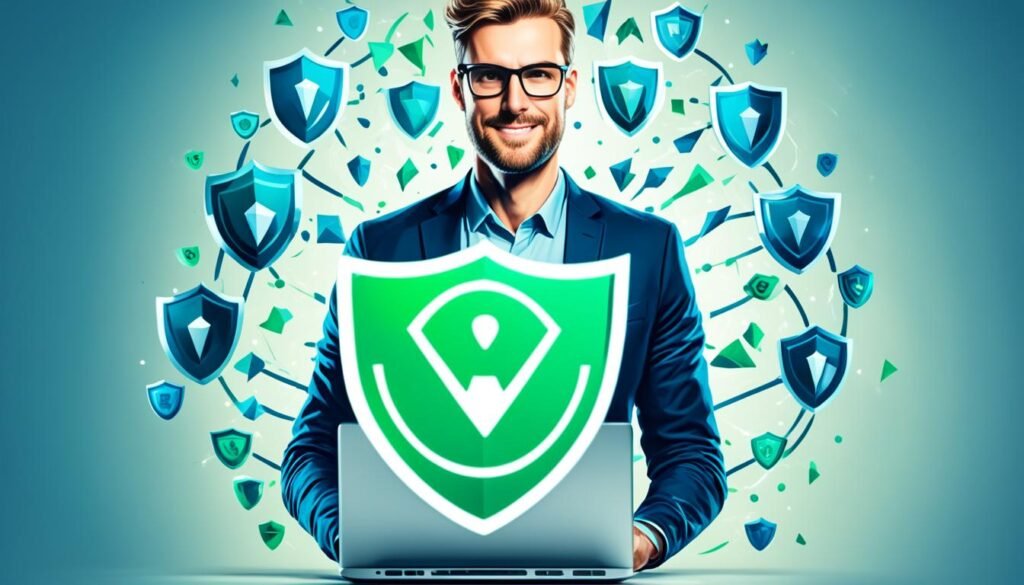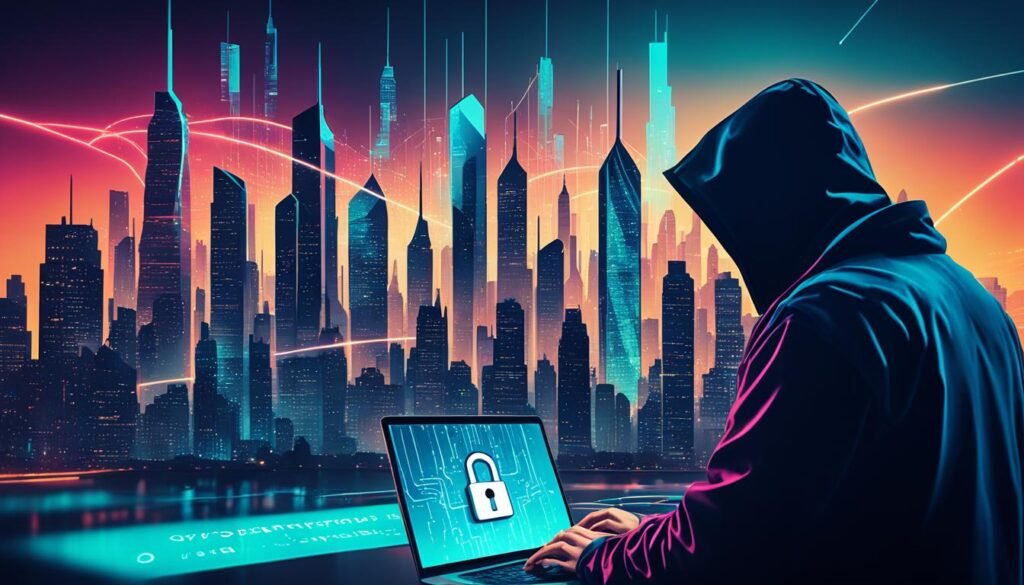Ever thought about keeping your online activities private and secure? A Virtual Private Network (VPN) app could be the solution. In today’s digital age, keeping your online life safe and private is key. VPN apps let you browse the internet safely by sending your data through secure servers.
Using a VPN like OpenVPN with 256-bit encryption keeps your data safe. More people are using VPNs because they know how important online privacy is. VPN apps make it simple to start your VPN, pick where you want to connect, and control your settings.
Apps like Secure VPN are popular for being easy to use and effective. They offer many server locations worldwide, giving you lots of choices for safe and private browsing. With more options available, finding the right VPN service that meets your needs is easier than ever.
What is a Virtual Private Network App?
A virtual private network app, or VPN app, is a software that makes a secure connection over public networks. It lets users send and receive data as if their devices were directly on a private network. This keeps data safe and private, even when using public networks.
Understanding the Basics
VPN apps have key features to boost security and privacy. They offer a Quick Connect feature for a secure server with just one click. Users can pick protocols like OpenVPN or WireGuard for speed or security.
Choosing servers is also a feature, great for accessing content blocked in certain areas. Features like Kill Switch, Split Tunneling, and Camouflage Mode add to the security and usefulness of VPN apps.
How VPN Apps Work
VPN apps create a secure link between a device and another network over the internet. This secure tunnel stops data from being intercepted, keeping it safe. Data is encrypted, so all info sent between the device and the network stays private.
Some VPNs have obfuscated servers to hide VPN use, which is key in places where VPNs are banned. Prices for VPN services vary, with top providers like ExpressVPN offering more security for a higher cost. Yet, many offer discounts for longer subscriptions.
But, there are downsides like slower internet speeds when servers are busy and the chance of VPN providers logging data. When picking a VPN, look at the price, data limits, reputation, server quality, location coverage, and privacy policy. A good VPN app ensures safe internet use from anywhere, protecting both sending and receiving data.
Why You Need a VPN App for Online Privacy
In today’s digital world, keeping your online life private is key. Virtual Private Network (VPN) apps are vital for better cybersecurity, especially on public Wi-Fi. Here are reasons why a VPN app is a must for your online privacy and data safety.
Protection Against Hackers
Public Wi-Fi spots are easy targets for hackers. VPN apps create an encrypted link, making it hard for hackers to get your data. This keeps your important info, like bank details and messages, safe from bad guys.
IP Address Masking
VPN apps also hide your IP address. This stops internet providers and websites from tracking what you do online. Even though VPNs don’t make you completely anonymous, they do boost your privacy by hiding where you are and what you’re doing online.
Bypassing Geo-Restrictions
Some websites block content based on where you are. VPN apps let you connect to servers in other countries, so you can get past these blocks. This is great for travelers wanting to watch their favorite shows or students trying to access blocked websites at school.
Some VPNs also have extra security features like ad-blockers and malware protection. This makes them a full package for keeping your online life safe and private. With top VPNs like Proton VPN at 5.0 and NordVPN at 4.5, you can find a good match for your needs.
Top Features of a Quality VPN Service
A top-notch VPN should stand out in key areas. First, a big VPN server network is key. NordVPN has over 5000 servers in 60 countries, giving strong global reach. ExpressVPN and Surfshark also shine with fast speeds, losing about 25% and 17% in downloads, respectively.
Security is a big deal. Top services use 256-bit encryption to protect your data. ExpressVPN is known for its strong encryption, making it a go-to for those who value security.
It’s also important to have a no-log policy. This means your online actions stay private, without any data tracking. NordVPN and Surfshark lead in this area, building trust with users.
A simple and user-friendly interface makes for a great experience. Easy designs and few ads help make using the service a breeze. CyberGhost is easy to use on Mac, and Hotspot Shield works well with Netflix, showing the value of simplicity.
Scalability and flexibility come from features like unlimited device connections. Surfshark, PIA, and IPVanish offer this, making the VPN useful for both personal and business use.
In conclusion, look for a VPN with a big VPN server network, strong security, a no-log policy, and an easy interface. This ensures great performance and safety for everyone.
Benefits of Using a Virtual Private Network
Understanding the VPN benefits can make your online experience better. VPNs bring many advantages, like better cybersecurity, safe remote access, and encrypted connections. These features give strong protection and keep your online privacy safe.
Improved Cybersecurity
A big plus of using a VPN is better cybersecurity. High-security VPNs use 256-bit encryption to keep your info safe from prying eyes. This means even if someone tries to intercept your data, it looks like gibberish to them. Top VPN services are great for anyone who wants to keep their data safe online.
Secure Remote Access
With more people working from home, secure remote access is key. A VPN lets remote workers safely connect to their company’s network. It also makes it easier for businesses to give employees secure data transfer with just a simple login. This boosts productivity and keeps company networks safe.
Encrypted Connections
A VPN’s encrypted connection is a big deal. It makes sure your data is safe when you’re online. When you use a VPN, your data is protected by strong encryption. This online protection is vital when using public Wi-Fi or shopping online, as it stops hackers from getting your sensitive info. Plus, many VPN services are just $3.50 a month, making them a smart and affordable choice for staying safe online.
Impact of VPNs on Internet Speed
VPNs offer many benefits for online activities, but they can also affect internet speed. They encrypt and route your traffic through another server, which might slow things down a bit. But, picking the right VPN can help reduce the VPN speed impact and keep your connection fast.
Understanding Speed Loss
Encryption is a big reason for speed loss. Encrypting your data for safe sending takes time and power. Also, the VPN server’s location is important; servers far away mean more delay, which can slow down your internet. This delay is even bigger when connecting from places like New York to Australia.
Server load during busy times can also slow down your connection performance. This happens when more users are online at once.
Choosing a Fast VPN
Picking a high-speed VPN with strong infrastructure can cut down on speed loss. Services like NordVPN at $3.49 a month or Surfshark at $2.29 a month, both on a 2-year plan, are good choices for speed. They manage server loads well.
Using modern protocols like OpenVPN, IKEv2, and WireGuard can also boost your connection. Plus, picking servers near you and avoiding busy ones will help speed things up.
VPNs have different features to help with speed. For example, Private Internet Access, at $2.03 a month for 2 years, supports many devices and has a dedicated IP for better speeds. Using wired Ethernet, restarting your modem/router, and closing apps you don’t need can also make your VPN faster.
For activities like streaming 4K videos, gaming, and video calls, you really need a high-speed VPN. By picking the right VPN and protocols, you can keep your VPN speed impact low while still enjoying privacy and security online.
Device Compatibility and Support

Choosing the right VPN service means looking for strong device compatibility. It’s important to find VPN apps that work on many devices. This way, you can protect your data on different devices and networks.
Desktop and Mobile Support
Many VPNs work with both desktops and mobile phones. This means you can keep your data safe no matter what device you’re using. Top VPNs support Windows, macOS, iOS, and Android. So, you can use VPN services on your PC, phone, or tablet.
Router Compatibility
If you have many devices at home or work, consider a router VPN. This sets up network security for all devices connected to your router. Devices like Netgate’s pfSense Plus and TNSR software are great for this. They boost security and speed with strong encryption.
Simultaneous Connections
Being able to use VPN on multiple devices at once is also key. Many VPNs let you connect several devices with one subscription. This is great for families and small businesses. It means everyone can stay safe online without extra cost.
Privacy and Security Features of VPN Apps
Choosing a secure VPN app means focusing on data privacy and strong security. Key elements include encryption technologies like OpenVPN, IKEv2, and L2TP/IPSec. These ensure your data is safe from hackers and trackers, making them essential for VPNs today.
A crucial part of a secure VPN is the no-logs policy. It stops data tracking and ensures VPN transparency. Users should pick VPNs that do this and have regular, independent privacy audits. Also, DNS leak protection is key to keep your web traffic safe from unwanted eyes.
Features like kill switches and server obfuscation boost data privacy. The kill switch cuts off your device from the Internet if the VPN drops, protecting your IP address. Server obfuscation helps users in places with strict internet rules to access global content without being caught.
Some VPN apps also block ads and trackers, stopping websites from gathering your data and making pages load faster. This not only helps with data privacy but also makes your online experience safer and quicker.
Subscription Costs and Pricing Models
Choosing the right VPN service means understanding its pricing. VPNs offer plans for a month, a year, or more, each with its own costs and perks. Let’s look at how these plans affect the total cost.
Annual versus Monthly Plans
Monthly and annual VPN plans have big price differences. Monthly plans cost from just under $10 to $17.95, making them flexible but more expensive over time. On the other hand, yearly plans cost less, averaging $2.49 to $5.99 a month. This makes yearly subscriptions a better deal for long-term use, offering lower costs each month.
Price Hikes and Deals
VPN services often have deals during holidays like Christmas and Cybersecurity Month. These deals can make the initial cost much lower. Users can also find discounts with VPN coupons or influencer codes. Standard monthly prices range from $2.19 to $17.99, but long-term plans can cut the monthly cost by up to 70%.
But, VPN prices can go up if they add more security features or servers. Choosing an annual subscription is often the best choice for both cost and reliability. It offers big discounts compared to monthly plans.
Final Thoughts on Choosing the Best VPN App
Choosing the best VPN service means looking at performance, security, and price. Start by checking for a no-logs policy, strong encryption, and a reliable kill switch. ExpressVPN and NordVPN are top picks for their strong security and wide server network.
Performance is key too. Even with encryption, the best VPNs keep your internet fast. Speed tests show that top VPNs work well for streaming and gaming. They cost about $10 a month or $66 a year and deliver great performance.
It’s important that a VPN works with many devices and is easy to set up. The best VPNs support up to five devices at once and are easy to install. Setting up takes less than two minutes on most devices, making it simple to protect your online activities. But, always pick a trusted VPN, keep it updated, and use strong passwords for the best security and privacy.


